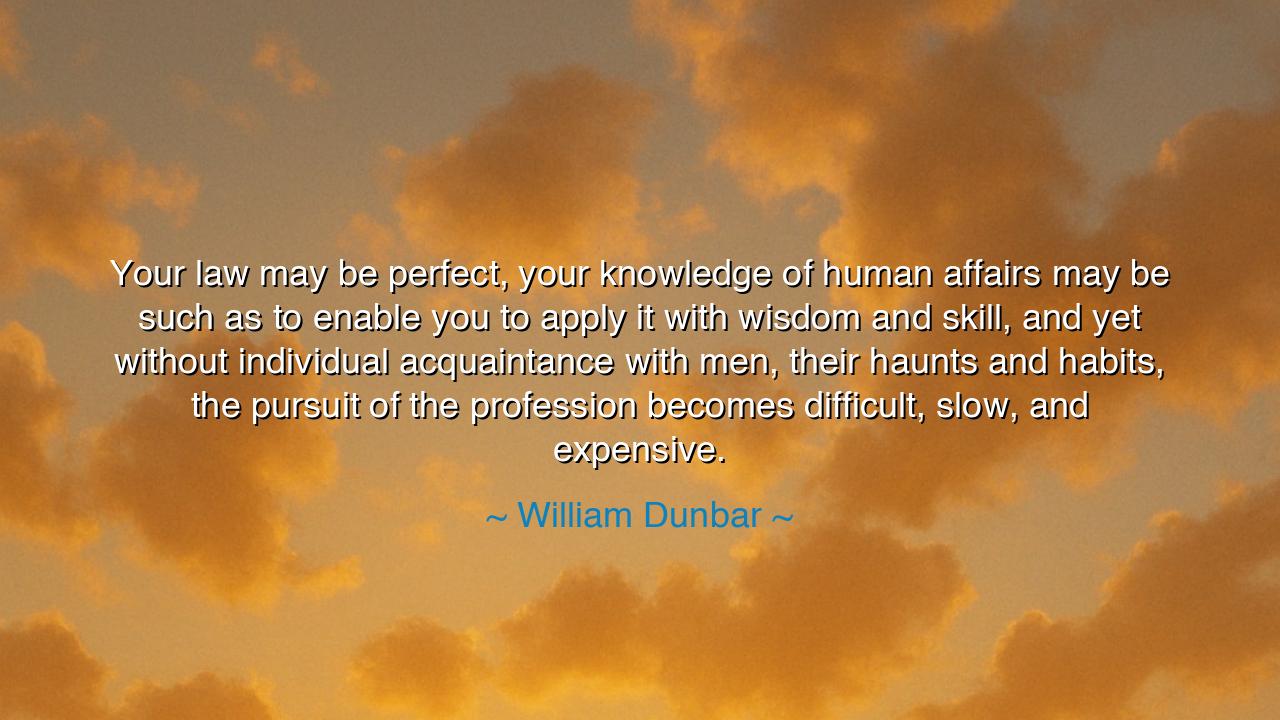
Your law may be perfect, your knowledge of human affairs may be
Your law may be perfect, your knowledge of human affairs may be such as to enable you to apply it with wisdom and skill, and yet without individual acquaintance with men, their haunts and habits, the pursuit of the profession becomes difficult, slow, and expensive.






“Your law may be perfect, your knowledge of human affairs may be such as to enable you to apply it with wisdom and skill, and yet without individual acquaintance with men, their haunts and habits, the pursuit of the profession becomes difficult, slow, and expensive.”
Thus wrote William Dunbar, a man of reflection and insight, who spoke not only to the jurists of his time, but to all who seek to master any art that touches the lives of men. In these words, Dunbar reveals an eternal truth: that knowledge without understanding of people is like a lamp without flame — bright in form, but without light. The laws we write, the principles we memorize, the systems we build — all these crumble into dust if they are not rooted in a living awareness of humanity. For wisdom in books is one thing, but wisdom in the world — that is the fruit of acquaintance with men, their haunts and habits.
When Dunbar speaks of “perfect law” and “knowledge of human affairs,” he honors the intellect, the study, and the labor of the learned. The law, in its ideal form, is a reflection of reason, a structure meant to order chaos and defend justice. And the knowledge of human affairs — history, philosophy, governance — equips the mind with principles and precedents. Yet he warns that these alone do not suffice. Without direct contact with the human soul — without walking among the people, listening to their voices, and understanding their struggles — the learned man becomes like an architect who designs cities he has never visited. The structure may be strong, but it will not breathe with life.
The origin of this insight lies in Dunbar’s own experience as a man of the law, observing how scholars and statesmen often falter when they forget that laws are not written for parchment, but for people. In his time, as in ours, there were those who trusted too much in the perfection of their systems, believing that abstract knowledge could solve every problem. Dunbar saw the folly of this faith in theory. He understood that the true art of judgment — whether in law, politics, or daily life — depends on knowing men as they are, not as we imagine them to be. A wise judge must read not only the letter of the law, but the expression in a man’s eyes; a wise leader must understand not only policy, but the habits, passions, and fears that shape the hearts of those he serves.
To see this truth in action, recall the story of Abraham Lincoln, who, before he was the savior of a nation, was a simple country lawyer. His mastery of the law was not merely in statutes or precedents, but in his deep understanding of people. He rode dusty roads, slept in humble inns, and conversed with farmers, merchants, and laborers. From them he learned their hopes, their speech, their sorrows. When he stood in court or later in the halls of power, it was this knowledge — not only of law but of life — that gave his words their weight. He could reach the common heart because he had dwelt among it. Thus, Lincoln embodied what Dunbar taught: that no intellect, however great, can replace human understanding born of empathy and experience.
In a broader sense, Dunbar’s words extend beyond the law. They apply to every profession and pursuit that deals with mankind — to teachers, physicians, artists, and leaders alike. The teacher who knows only her subject but not her students cannot truly teach; the physician who knows medicine but not the patient cannot truly heal; the leader who governs by theory but never listens to his people cannot truly lead. Knowledge may give one authority, but understanding gives one influence. And influence — the power to touch hearts and move others toward truth — comes only from genuine familiarity with the human condition.
Dunbar’s warning also holds a moral depth: he reminds us that to know others, we must first walk among them. Too often the learned withdraw into their towers of intellect, forgetting that wisdom is not isolation but communion. To grow wise, one must observe without arrogance, listen without judgment, and walk with humility through the varied paths of human life. The scholar who closes his books to walk among the poor, the judge who visits the fields of the farmer, the leader who hears the cry of the worker — these are they who turn knowledge into compassion, and compassion into true wisdom.
Therefore, O seeker of understanding, take this teaching into your heart: perfect knowledge is lifeless without human insight. Study deeply, learn the principles of your art, but do not let your learning become a wall between you and the world. Go forth among men — learn their ways, their joys, their burdens. Listen to the stories told at the marketplace, the songs sung in sorrow, the laughter shared in rest. For in knowing others, you will come to know life itself — and only then will your knowledge become living wisdom.
For as William Dunbar teaches, it is not enough to hold the law in your mind or wisdom in your books; you must hold humanity in your heart. For only when reason and compassion walk hand in hand can any profession — be it of law, art, or life — fulfill its true purpose: to serve, to uplift, and to understand.






AAdministratorAdministrator
Welcome, honored guests. Please leave a comment, we will respond soon